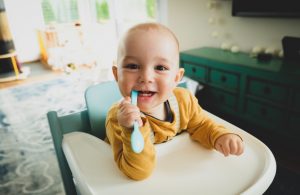Table of Contents
Introduction
You have probably wondered what the purpose is of baby teeth. The first set of teeth you end up with are also called milk teeth or deciduous teeth. They emerge in infanthood, and they begin falling out from the ages of six to 13 so that the adult teeth or permanent teeth take over. There are several reasons that you always start with baby teeth, and then they fall out for the permanent teeth to take over. However, before getting into the reasons for that, you may not know what the first set of teeth look like and the order they emerge. Let’s talk about what baby teeth look like when they come in.
What Do Baby Teeth Look Like When They Come In?
The majority of babies have teeth between the ages of six months of age and twelve months. However, sometimes infants develop their first tooth right after their first birthday, and others may have a tooth or two present at birth! That is the exception and not the rule. However, infants develop their first set of teeth from six to nine months of age in most cases. When they are three months old, they begin showing signs of teething, where the first set of teeth are ready to emerge. That is why infants start drooling, having fevers, have rashes on their cheeks, and are cranky.
The best thing you can do is give them a chilled teething ring from the fridge to help soothe the discomfort they experience. A cold, wet clean cloth works and can wipe their gums with it, which will help with soothing. However, when the first set of teeth emerge, they are usually on the lower front teeth, known as the lower central incisors. Then the prominent upper teeth or lateral central incisors emerge generally from nine to twelve months of age. The canine teeth usually appear when the baby is eighteen months old or several months before or after. Then finally, the molars begin to emerge around that time as well, and by the time your infant has all of their teeth, they are close to three years of age.
You now know what teeth look like as they emerge; why do they even exist? Why do we not go right to the permanent teeth once the teething phase begins? Let’s talk about that now. That reason is for space preservation.
The Baby Teeth Are The First To Come For Space Preservation
Humans are mammals, and mammals are diphyodonts, which means there are two sets of teeth grown with age. When you are a baby, your skull is small, which means jaws are small. If the first set of teeth were adult teeth, then the mouth would be too small to accommodate adult teeth’ size and number. That is why the baby teeth are the ones to come in until the skulls are large enough to begin adapting permanent teeth around six years of age. That is why your first set of teeth fall out at six years old. The first set of baby teeth to fall out are the lower central incisors, which were the first teeth in infancy.
The baby teeth that fall out would go in the order that they came in. That means the next set of teeth to fall out would be the lateral central incisors around seven years of age. And eventually, once the last stage of baby molars fall out, you are either 12 or 13 years of age. At that point, your skull has grown large enough to accommodate the size and number of adult teeth. Kids have a total of 20 baby teeth, and adults have a total of 32 teeth. Now, you may be wondering what the point would be of baby teeth having to fall out? Why do we eventually need adult teeth?
What Is The Point In The Baby Teeth Falling Out In The First Place?
If you never outgrew your baby teeth and they remained in your gums since infanthood, then your skull would end up being too large to accommodate them as well. There would be too much space between them, which means you would not be able to effectively chew your food. That is why you need to grow in adult teeth as you mature during childhood, which means the baby teeth must fall out. Therefore, baby teeth are just placeholders until you are physically ready for permanent teeth to take its place.
However, you might wonder what happens if you end up losing a baby tooth before you are old enough for your permanent teeth to take over.
What Happens If You Prematurally Lose A Baby Tooth?
Children under the age of six losing a baby tooth because of an accident are common. Dentists have pulled baby teeth because of rampant tooth decay, which led to the same result. Baby teeth lost prematurely. That increased the chances of experiencing crowded teeth in adulthood. That requires a lot of orthodontic work. A loss of a baby tooth early on can also delay the emergence of the adult tooth because of the bone growing over it. Therefore, it is best to allow the baby teeth to fall out when it is the right time. That way, the adult teeth will emerge the right way.
Conclusion
Every infant grows baby teeth until they at a certain point during childhood to develop in adult teeth which involve the baby ones falling out. The idea of you having baby teeth initially seems pointless considering that they eventually fall out so that adult teeth grow. However, if you grew in your permanent teeth during the time you were an infant or toddler, that would not work.
Adult teeth would take up too much space in the mouth of a small child. Their skulls and jaws are too small to handle that. That is why nature causes the baby teeth to fall out when kids are large enough to start growing in their permanent teeth.

